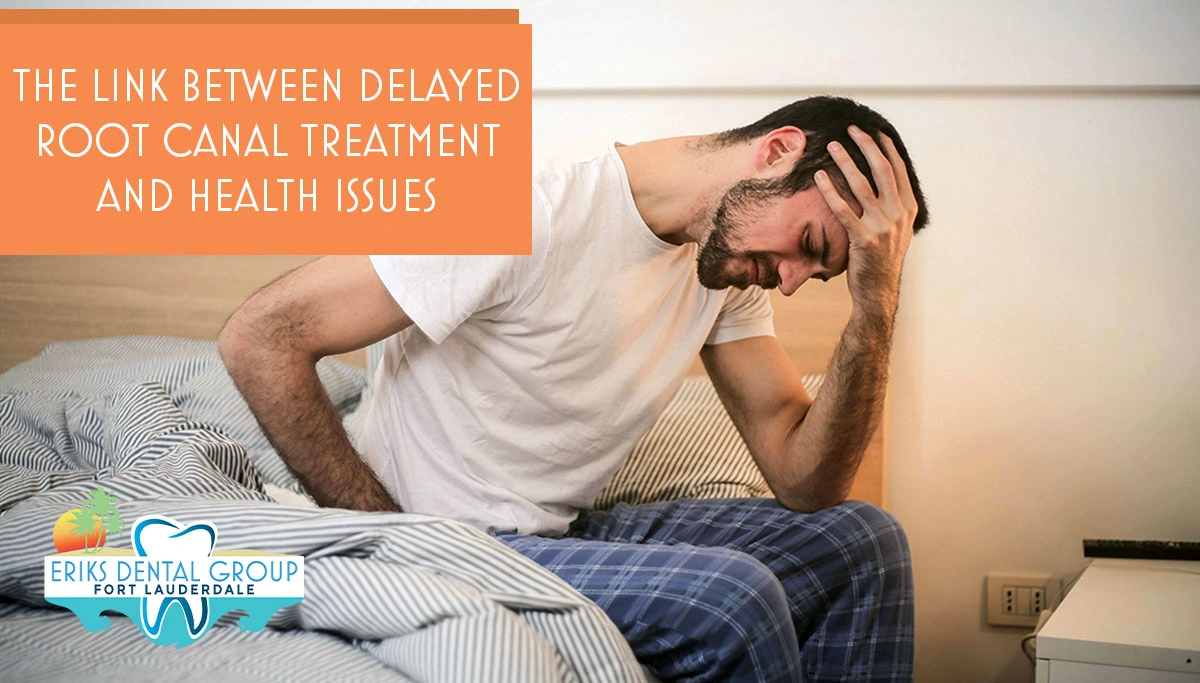
So, you have tooth pain. Maybe it’s been there for a while. You suspect you might need a root canal, but hey, you’re busy. Scheduling a dentist appointment in between work meetings and school drop-offs isn’t exactly a top priority.
And the cost? Ugh. Who needs another medical bill right now? The pain isn’t unbearable, so you figure, I’ll deal with it later. But here’s what most people don’t realize. Ignoring that root canal can affect more than just your tooth. It could impact your entire body. Wait too long, and that untreated infection could travel to your jaw, your bloodstream, and even your vital organs.
So, what kind of pain actually means you’re headed for a root canal? And more importantly, what other health issues can arise if you don’t schedule a dentist visit? We’ll share all the insights you need to know so you can take the next step to prevent further pain and health problems.

Tooth pain can be tricky. One day, it’s a little sensitive to hot or cold foods. The next, it’s screaming when you bite into a sandwich. If you’re wondering whether the pain you’re feeling might mean you need a root canal, here are some common signs to watch for.
A deep, constant ache (especially one that feels worse at night or when you lie down) can be a sign that infection has reached the nerve.
A quick zing from hot or cold food is one thing. But if the pain lingers for 30 seconds or more? That’s not normal.
If it hurts to bite down or even touch the tooth, inflammation or infection could be building at the root.
Localized gum swelling or a small bump near the tooth could be a sign of an abscess. That’s a pocket of pus that needs treatment fast.
A lingering bad taste or persistent bad breath could be caused by drainage from an infected tooth.
If one tooth is turning gray or dark, the nerve inside may have died, an advanced sign of infection.
If your toothache comes with low-grade fever, swollen lymph nodes, or if you’re just feeling generally off, it might mean the infection is spreading beyond your mouth.
If any of these symptoms sound familiar, don’t wait. The sooner you treat the problem, the more likely it is that you can save your tooth and avoid more serious health risks.

When you put off a root canal, the problem won’t magically disappear on its own. It will keep growing. Literally. At the center of your tooth is soft tissue called pulp. It contains the nerves, blood vessels, and connective tissue.
When this tooth pulp becomes infected or inflamed (usually due to deep decay, cracks, or trauma), you need a root canal to clean it out and stop the spread. And if you don’t treat it, here’s what can happen inside your tooth.
Bacteria multiply and eat away at the pulp. Eventually, it reaches the tip of the root and enters the surrounding bone. That’s when the real pain starts, or sometimes oddly stops (because the nerve dies.)
This is a pocket of pus that builds up at the root of the tooth. It can cause swelling, facial pain, a bad taste in your mouth, and even a mild fever. Left untreated, it may burst, or the infection may spread elsewhere in your body.
Even if the pain fades, that doesn’t mean the problem is gone. It often just means the nerve inside the tooth has died, but the infection is still active.
When bacteria from an untreated tooth reach your bloodstream or nearby tissues, it can lead to far more serious health problems than most people realize.
Here are just a few of the risks:
It’s easy to think of tooth pain as “just a dental issue,” but your mouth is directly connected to your overall health. The sooner you treat the infection, the safer (and healthier) you’ll be.
Root canals are often seen as painful and unpleasant, thanks to outdated perceptions and pop culture. Even with modern, nearly pain-free techniques, the procedure still carries a reputation for discomfort and dread. The most common reasons people avoid dental treatment include fear of pain and dental anxiety. And honestly, these are valid reasons. But the longer you wait to schedule your dental appointment, the worse (and costlier) it usually gets.

Root canals get a bad rap, but in reality? They’re not that bad. Thanks to modern dentistry, they’re faster, easier, and far less painful than people think.
A root canal really only feels about the same as getting a filling, thanks to a local anesthetic.
Most root canals can be completed quickly and efficiently. No endless cycle of appointments.
A root canal can, in many cases, save your teeth from extraction. It will remove the infected pulp, clean the area, and seal the tooth. That means you get to avoid more expensive work, like dental implants or bridges.
If you’re dealing with tooth pain or suspect you need a root canal, don’t wait. Treating the problem early can save your teeth, your wallet, and your overall well-being.
Call Erik’s Dental Group Fort Lauderdale at 954-463-5051, or contact us online. Our friendly dental team is always here to answer your questions and get you scheduled, on your terms, and with your comfort in mind.
© 2026 Eriks Dental Group - Fort Lauderdale - All Rights Reserved. Dental Website Design by Connectica